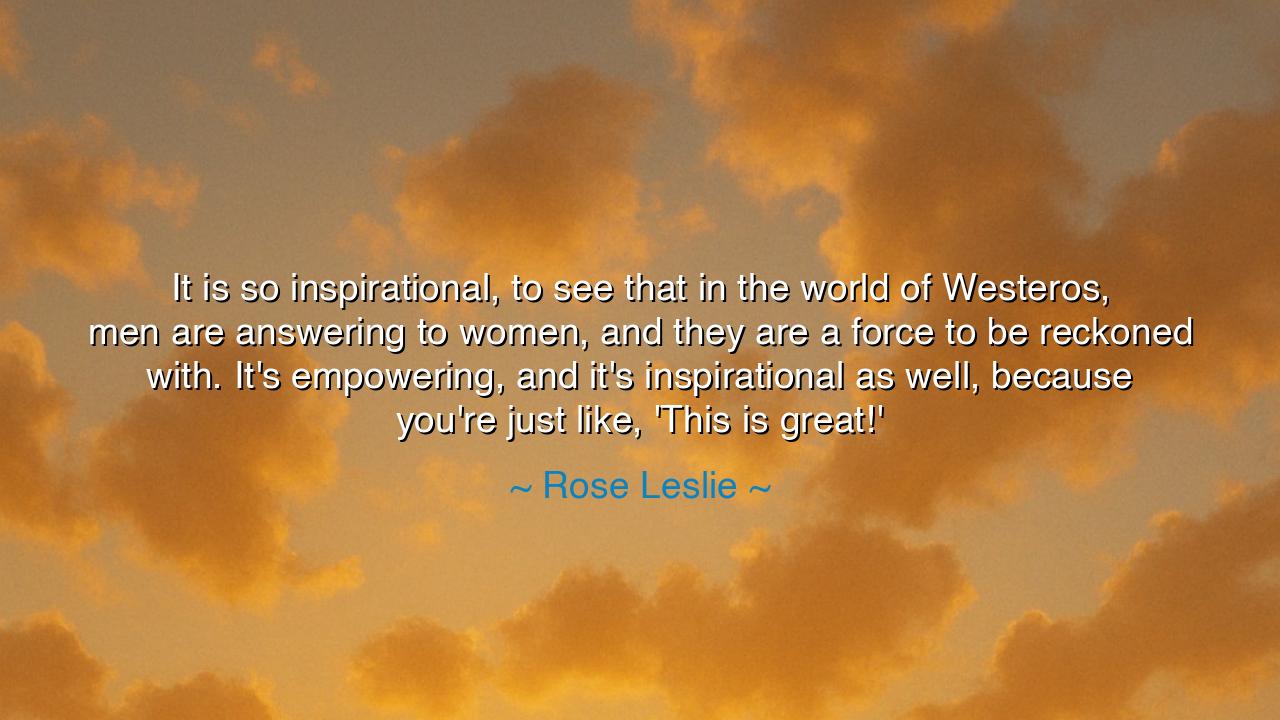
It is so inspirational, to see that in the world of Westeros, men
It is so inspirational, to see that in the world of Westeros, men are answering to women, and they are a force to be reckoned with. It's empowering, and it's inspirational as well, because you're just like, 'This is great!'






In her words, Rose Leslie captures the spirit of a changing age: “It is so inspirational, to see that in the world of Westeros, men are answering to women, and they are a force to be reckoned with. It's empowering, and it's inspirational as well, because you're just like, ‘This is great!’” Though she speaks of a fictional world — the realm of Westeros from Game of Thrones — her reflection is rooted in a very real awakening: the rise of women as leaders, warriors, and creators in both story and society. In her joy, there is also reverence — for the strength that once hid in the margins is now standing boldly at the center.
Throughout history, power and storytelling have been intertwined. Those who shaped the myths of their age shaped the vision of the world to come. In the ancient epics of Greece, women were too often silent muses or tragic victims. Yet even in those silences, their power lingered — Penelope’s patience held an empire together, Antigone’s defiance gave moral birth to the conscience of mankind. So too, in Westeros, women like Daenerys Targaryen, Arya Stark, and Cersei Lannister embody the long-delayed emergence of female power — fierce, flawed, but undeniable. Rose Leslie, who herself brought life to the wild and brave Ygritte, sees in these women a reflection of a timeless truth: when women command their destinies, the world shifts upon its axis.
Her words — “men are answering to women” — echo with the rhythm of justice delayed but not denied. For centuries, the balance of power tilted toward the hand of man, but history shows us that the pendulum always swings back. The queen, the matriarch, the seer, the scholar — these figures existed in every civilization, though often unacknowledged. Think of Cleopatra, who ruled an empire not by the sword but by intellect; or Joan of Arc, who defied kings and led armies with divine fire; or Queen Nzinga of Ndongo, who faced European invaders with strategy and will unmatched. Each, like the heroines of Westeros, reminded the world that leadership has no gender — that the power to command is born from conviction, not inheritance.
Yet Leslie’s admiration carries not the tone of rebellion, but of recognition. “It’s empowering, and it’s inspirational,” she says, marveling not at dominance but at balance — a world where women and men meet as equals, and where reverence replaces rivalry. This is the deeper meaning beneath her joy: that art imitates evolution. Fiction gives birth to vision, and vision gives birth to change. The world of Westeros — though dark and cruel — mirrors the transformation of our own. Through its queens and warriors, it whispers that women no longer wait to be saved; they are the saviors, the strategists, and the storytellers.
In the great cycles of civilization, art has always been a mirror to morality. When the goddesses of antiquity — Isis, Athena, Kali — ruled in myth, humanity understood creation and destruction as a balanced force. When their images were buried beneath the weight of empire, the world grew colder, divided. Now, through modern mythmaking — through the screens and scripts of our time — those goddesses rise again, clothed in new names and new stories. Rose Leslie’s words honor this return: not merely of women’s strength, but of the harmony between strength and compassion, logic and love, fury and grace.
Let us, then, draw wisdom from her reflection. To see women in command — in art or in life — is not to witness inversion, but restoration. It is to behold the natural order of humanity rediscovered. Let men and women alike find inspiration in one another’s strengths, and remember that true power does not silence others — it amplifies them. For when one half of the human spirit is dimmed, the whole world stands in shadow.
And so, the teaching is this: celebrate the rise of balance. Encourage voices that have long been muted. Honor courage wherever it blooms — whether in the battlefield or the boardroom, the classroom or the home. For the realm of Westeros may be imagined, but its lesson is real: when women stand as forces to be reckoned with, humanity itself stands taller. This, indeed, is “great.”






AAdministratorAdministrator
Welcome, honored guests. Please leave a comment, we will respond soon